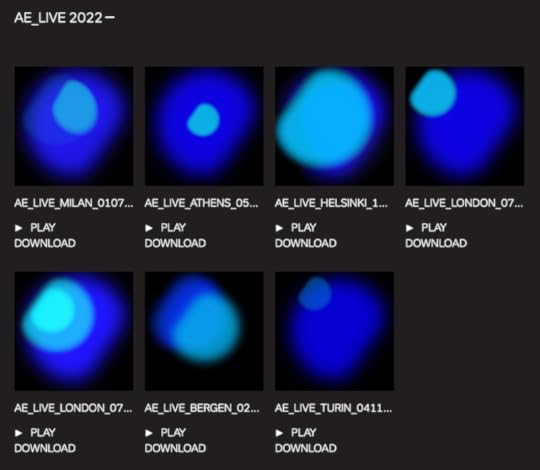Render Wander: AE_LIVE 2022– (Semi–Live Blog)

AE_LIVE 2022– is the latest from Autechre, the duo of Rob Brown and Sean Booth, just out today, August 10, 2023, on their longtime label home, Warp Records (warp.net — at the moment, it’s not on Warp’s Bandcamp page). As I’ve attempted in the past, I’m going to embrace the release’s voluminous depths — seven nights recorded in six cities (Milan, Athens, Helsinki, Bergen, Turin, and two in London), rendering as over seven hours of music — and try to keep track of thoughts as I wander through its murky territories.
I’ll be updating this as I go, which might involve re-listening to one or more of the seven evenings and adding more notes.

General thoughts as they surface:
01 Why does each evening have an underscore before the year, but the album title doesn’t?
02 Why do all the downloads just have the album cover instead of the individual track covers? At least that’s what happened when I downloaded them as a single large set.
03 Are the concerts really just an hour apiece, or is this a select section of each evening?
04 Athens (Greece, not Georgia) lucked out — it’s over 20 minutes longer than the shortest of the evenings (the second of the two London shows).
05 Note to users: each evening is one uninterrupted track, with no song (or in Autechre’s case: “song”) titles.
06 There are three purchase options: MP3, WAV / FLAC, and WAV (24-bit). I splurged for the latter, though I wonder if my aging ears can hear the difference (or if my younger ears could have).
07 A friend pointed out that the randomly generated names of the Zip archives (e.g., “8c54-b5c73ad8e50b.zip”) that contain the downloadable audio files look like the titles of Autechre releases.
08 I’m wondering how these were recorded. I’m guessing straight from the mixing board. I wonder if the audio factors in, at all, the spaces in which the performances happened.
09 When I use the term “machines” I mean virtual ones, as well, of course.

AE_LIVE_MILAN_010722
00:00:10 — The Milan evening, the opening of the collection, sneaks in so quietly that I hit pause a few seconds after it starts, perhaps more a sign of my impatience than anything else. I wonder if my headphones are connected, if my laptop is functioning. Then I hit play and there’s finally a comforting frazzled-circuits sound before the muffled beat kicks in. It’s almost like walking into the hall after the concert has begun, after proceeding down a series of corridors, the music seeping in until you finally arrive at the main room.
00:07:25 — Sometimes I think we’ll find out that the algorithmic and generative approach Autechre is known for actually takes a back seat to simply using voice control as a means to control sound: to shape it, to transform it, to manipulate various settings. This phrasing, familiar from other work in recent years, often sounds like human speech straining to be comprehended. Or metaphorically, a machine doing so.
00:19:21 — I often find myself actively resisting the urge to rewind when first listening to a new Autechre release. A minute ago, I’d swear, this percussive noise — ploppy, arid — was much pitched much higher, and I’m wondering how it got here from there.
00:20:23 — Those percussive noises are getting deeper and wetter, confirming the downward trajectory mentioned just above.
00:22:02 — This is entering “pachinko in Limbo” territory.
00:28:25 — More Pacman than patchinko by now. Autechre doesn’t get enough credit for her playful it often is. Though admittedly, I like it most when it’s less playful.
00:34:50 — I could deal with more of this evocative Scheherazade fantasia slo-motion material.
00:36:33 — After over half an hour of near seamless transitions, this moment arrives like the firmest division of before and after thus far: a solid downbeat, even if it’s quickly subsumed by the luxuriant electronica morass. Tellingly, the impact disperses quickly.
00:38:11 — It’s like cybernetic wind shear.
00:39:56 — As is often the case, Autechre brings to mind The Sorcerer’s Apprentice, not just the metaphor of replicate systems run amok, but the overall elaborate approach.
00:56:25 — A funky, soulful, slinky reminder of how much of Autechre exists in part as a willful complication of popular forms. A minute later, though, the music has really dissolved (welcomingly).
00:58:01 — And now the (almost) poptimist veil is fully lifted, and the creaky undergirding is what we’re left with (and it’s all the better for it).
01:00:49 — It’s getting dryer and dryer, back to the pointillist percussion from very early on. It feels, though, like we’ve gotten back to where we started without going in reverse. The tiny, percolating, ping-ponging beats emerge from something other than what they submerged into at the start of the session.
01:02:44 — Cybermumblecore at its best. I fully admit that I generally prefer Autechre at the extremes: when it is at its most or (as here) least aggressive.
01:06:18 — Music like Autechre’s, redolent of technical virtuosity (and all the more fascinating because it sounds more interested in using machines at cross-purposes rather than merely getting the engines functioning at peak performance — which is, come to think of it, the difference between the emergent Miles Davis electric era, and the mainstream fusion that followed upon it), can feel at times like it’s letting you know how it functions. As the set comes to an end, the beat slows, like something made of gears that is coming to a stop. I can’t help but think that this is, nonetheless, an illusion: a theatrical depiction of a machine coming to rest, not the actual sound of Autechre’s technology being slowed.
01:06:40 — And the beat is gone. And the fade-out sounds like a granular freeze of the moment: slowed, then muffled, then over.

AE_LIVE_ATHENS_050722
00:00:01 — This one starts off strong. I’m also aware it’s the longest of the collection’s seven sets, so I’m pacing myself. That glitchy static sound is the same as on Milan, but it’s buried in there, and the beat is more straightforward, the overall effect much more present, much less enveloped by sonic vellum.
00:01:45 — Hope you weren’t sitting to close to the speakers when this beat hit. It sets everything thus far into the background. Fascinating effect. If Milan accomplishes the backgrounding of sound with muffly low-pass filters, this one does so by putting something even louder and more precise in the foreground. Your sonic field of vision, so to speak, changes immediately and immeasurably.
00:02:55 — The heavier of the beats is flying around space, like a marble in a box.
00:05:06 — Another one of those moments when you wonder how exactly it got this frenetic without ever feeling like it’s suddenly switched gears.
00:06:08 — Autechre uses bursts with some frequency. Bursts are like the opposite of glitch, or more to the point they’re like full-bodied glitch, quick arrays of sustantive sequential beats in fast succession. What makes them work here is the sheer randomness of the patterning. A lot of people describe listening to Autechre like being under assault. This is what real assault is like: volume and complexity is one thing, but it’s the mercurial brutality that makes it really overpowering.
00:07:41 — The bottom suddenly dropped out, all but a series of what sounds like computer-modeled aluminum pans flapping in the breeze.
00:10:54 — If you’d been waiting for alien dance music, then you’ve been happy for a while by this point.
00:22:04 — Autechre in its xenobiology phase, all alien noises
00:22:32 — Another sudden shift, things again slowing, like we’ve entered a lounge bar. What will follow: luxuriant mellowness, or a sudden assault? The thing about PTSD techno is there doesn’t need to be a beat for you to await the next beat. Meanwhile, as the seconds pass, there is clicking like nothing so much as intercepted — and indecipherable — communication.
00:24:00 — And another transition, this time with a four on the floor groove, like the dance is happening overhead, a few stories up.
00:25:35 — And another transition, into a pachinko parlor with failing electricity, the emergency alerts melting.
00:31:57 — Proper ethereal vocals have been part of the mix, and I have no idea for how long. They arrived like ghosts and, as with so many transitions in Autechre’s music, you don’t know they’re there until they’ve been there.
00:37:13 — There are fierce little pings at work that are unlike anything until now, sharp hard sounds that have a deeper pitch than anything this brief should be capable of.
00:39:30 — And a whole new sonic ecosystem has emerged. There are so many transitions in this Athens show. You’re continously shifted from one to another. There are so many, I’ve lost count, and as they proceed, I note them less frequently. You just have to give yourself over to the constant change.
00:48:20 If you’ve listened to enough Autechre, you know the difference between “pachinko” mode and the rarer “bug zapper” mode. This is, for a spell, the latter.
00:51:75 — If you wanted to know what an Autechre album on the Chain Reaction label would sound like, here you are. And where it goes is fantastic, all wiry acrobatics and more alien vocalizing. This is a reminder not to expect the section — or any section — to last long.
00:54:46 — If I were teaching a class about classic Autechre moves, I’d mark this transition as a teachable moment. Back it up, listen, get into the groove, and then pay attention at and after this juncture, as it frays and becomes something else entirely.
01:00:00 — Cybernetic melodica amid pulsating techno. A great moment.
01:04:23 — If the whole set didn’t have such a consistent sense of digital perfection, the echoing at work here would make me think it was recorded outside, or in a deep hall so large it constitutes its own macro-environment. Bonus for more muffled vocalizing.
01:11:55 — The end of this sets feels like it’s setting a high bar. It’s a sprawling procession of fleeting ideas and sensory frames, and yet it never breaks or pauses. It morphs continuously and seamlessly.
01:13:00 — I’m trying to imagine what this was like in a large crowd, because as the piece nears the end, the scale shrinks, and it gets downright intimate. As in Milan, it slows like a machine running out of gas.
01:16:17 — As the Athens show doesn’t so much come to a close as continue to come to a close, I wonder if part of its extended length (relative to the other sets) represents Autechre having recognized at the time that they had something good going, and they just went with (and for) it. This last 10 minutes or so is Autechre’s version of a slow jam, and I’d happily take an album of it.



